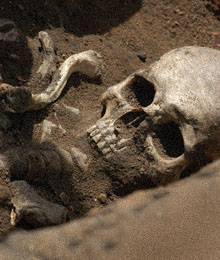Bill Bass and the Body Farm
October 14, 2010 by Michael Hill
Filed under Special Features
 A crime scene investigator leans over a dead body at a local train yard. Slowly removing his stylish sunglasses, he crouches down to examine the body more closely. Exploring the pocket of the victim’s jacket, he finds several stray hairs and a ticket stub. “Let’s get these back to the lab for a DNA analysis,” he instructs. Standing and replacing the sleek shades over his eyes, he looks into the camera and says, with all seriousness: “Looks like this guy’s punched his last ticket.” Boom! Television gold.
A crime scene investigator leans over a dead body at a local train yard. Slowly removing his stylish sunglasses, he crouches down to examine the body more closely. Exploring the pocket of the victim’s jacket, he finds several stray hairs and a ticket stub. “Let’s get these back to the lab for a DNA analysis,” he instructs. Standing and replacing the sleek shades over his eyes, he looks into the camera and says, with all seriousness: “Looks like this guy’s punched his last ticket.” Boom! Television gold.
If you’re a fan of primetime TV, this scene may seem all too familiar – probably similar to some episode of CSI: Crime Scene Investigation. Although they are often hyper-stylized for entertainment purposes, these shows are based on real-world science.
Bill Bass, a forensic anthropologist, is the head of probably one of the coolest-named research facilities in the world: The Body Farm. Outside of sounding like an ’80s Slasher flick, the Body Farm provides police with scientific information used to solve crimes of the past, as well as ones of the future.
Officially named the Anthropological Research Facility, the Body Farm opened in 1981 at the University of Tennessee. It is the first scientific research lab devoted to the study of human decomposition in “extended postmortem interval.” Using donated bodies, graduate students and faculty members study the various aspects of decomposition under a variety of conditions in the weeks and months after death. Bizarre? Maybe. But this research has become a major asset to the academic community as well as to law enforcement.
“UT’s Anthropology Department now has the world’s largest collection of modern skeletons whose age, race, and sex is known. That’s an incredible teaching tool for our anthropology students. It’s also an important source of reference data for anthropologists and other forensic scientists,” explains Bass in an interview with Harper Collins Publishers.
Since the Body Farm started, massive piles of information have been compiled across multiple fields of study, leading to the development of tools that assist law enforcement officers identify bodies. One of those tools is a computer program that helps determine the sex, stature and ethnicity of unknown skeletons.
“ForDisc compares the unknown skeleton’s measurements with thousands and thousands in what’s called the Forensic Anthropology Data Bank, which was created from the measurements of all the skeletons in the UT skeletal collection, plus more and more measurements sent in by anthropologists around the world,” Bass declares.
Not only has Bass’ research made leaps and bounds for forensic science – giving tools and standards against which to measure – but, thanks to primetime television, his field of work becomes ever more popular. Shows like CSI and Criminal Minds raise awareness for forensic science, further supporting Bass’s research. But such popularity comes with a price.
“Well, they’ve certainly done a lot to raise the profile of forensic science, and they’ve also inspired a lot of young people to want to pursue forensic careers, and those are both good. On the other hand, there’s a lot of dramatic license in those shows, and those create unrealistic expectations in the public’s mind … It’s getting to be such a problem, police and prosecutors call it the ‘CSI effect,’” says Bass. Such is true: The spectacle of television often gives the public a misconception of how things work in reality but, as mentioned earlier, this is done for entertainment purposes.
However, the process and limits of DNA testing should be more greatly appreciated. According to the U.S. National Academy of Sciences (NAS), the viewing of these crime investigation TV shows gives the public an impression that the techniques on the show are pure science and that forensic evidence is watertight. In reality, there are substantial variations in forensic science disciplines, with no standards for analyzing, processing and reporting on findings. While forensic evidence like DNA is generally very reliable, others – such as fingerprint and microscopic hair analysis – are not always so. Recognizing the limitations of current forensic science, NAS has recommended that the U.S. institute standardized tests and certified forensics experts to ensure forensic evidence is handled correctly.
This call for standardization in forensic science is just a recent part of the history of modern forensic science. Although TV draws attention today, the need for Bass’s research stemmed from questions that had no previous answer. “The questions and needs of the police help influence or drive research. In fact, those are what inspired me to create the Body Farm. Police were asking me questions about decomposition and time since death that I couldn’t answer, so I started the research facility to learn more,” Bass recalls. Undoubtedly, Bass’s research has proven invaluable for the real world but it has also grown into an interesting side project. After working on a pair of documentaries about the Body Farm with journalist, writer and documentary filmmaker Jon Jefferson, Bass has also tried his hand at fiction. Writing a series of New York Times bestselling crime novels based on cases and research he was involved in, Bass is able to give the public a look into his world through a fictional lens. Creating fictional crime thrillers may seem like an odd avenue of release, especially when constantly surrounded by death, but Bass feels a brighter disposition is a necessity.“Not to take away from the human tragedies, but you have to laugh sometimes, or you’d give in to despair,” Bass reveals. Although this research may be far too morbid for some people’s taste, Bass’s work continues to be instrumental in modern day forensic science. It may not be as glamorous as television leads us to believe but the Body Farm continues to assist in the upholding of justice, and may just have the coolest name in the whole science community. www.jeffersonbass.com
Suggested reading: The Body Farm Novels: The Bone Thief by Jefferson Bass.









Comments
Feel free to leave a comment...
and oh, if you want a pic to show with your comment, go get a gravatar!